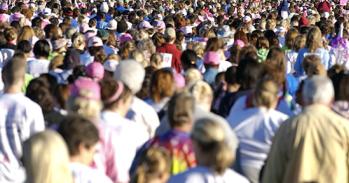
A new rapid diagnostic test for COVID-19, developed by a University of Cambridge spinout company and capable of diagnosing the infection in under 90 minutes, is being deployed at Cambridge hospitals, ahead of being launched in hospitals nationwide.
A new rapid diagnostic test for COVID-19, developed by a University of Cambridge spinout company and capable of diagnosing the infection in under 90 minutes, is being deployed at Cambridge hospitals, ahead of being launched in hospitals nationwide.
This is a game changer
Sir Chris Hohn
The SAMBA II machines, developed by Diagnostics for the Real World, provide a simple and accurate system for the diagnosis of infection with SARS-CoV-2, the virus that causes the disease COVID-19. They will be used by healthcare workers at point-of-care in order to rapidly diagnose patients, directing those who test positive for the infection to dedicated wards. They can also help identify which healthcare workers are infected, enabling those who test negative to return to the front line.
The machines will be made available to a number of hospitals across the country thanks to a US$3million (about £2.4 million) donation from the businessman and philanthropist Sir Chris Hohn, which will enable the purchase of 100 machines. The donation has enabled Addenbrooke’s Hospital, part of Cambridge University Hospitals NHS Foundation Trust, to obtain the first 10 SAMBA II machines this week for use in wards where suspected COVID-19 patients are brought in. The donation will be matched by the purchase of 10 additional machines by the Cambridge Trust.
SAMBA II looks for tiny traces of genetic material belonging to the virus, amplifies it billions of times chemically and is therefore extremely sensitive in the detection of active infections. Dr Helen Lee, CEO of Diagnostics for the Real World said: “Our goal has always been to make cutting-edge technology so simple and robust that the SAMBA machine can be placed literally anywhere and operated by anyone with minimum training.”
Patients will provide a nasal and throat swab. Once these have been loaded into the SAMBA machine, the remainder of the process is fully automated. At the moment, tests are sent for analysis in centralised laboratories and this, compounded by the sheer number of samples that are having to be analysed, means that diagnosis can take one to two days. SAMBA II is able to deliver results while the patient waits, helping healthcare workers ensure that those infected can be quickly directed to specialised wards. Whereas current tests can take over 24 hours or longer to deliver their results, SAMBA is able to deliver a diagnosis in less than 90 minutes.
The tests have been validated by Public Health England, Cambridge, in 102 patient samples and shown to have 98.7% sensitivity (ability to correctly identify positive cases) and 100% specificity (the ability to correctly identify negative cases) compared to the currently used NHS/Public Health England test. This has enabled the team to obtain a CE mark.
Dr Martin Curran who conducted the evaluation said: “I am extremely happy with the performance of the SAMBA test because it matched the routine centralised laboratory results.”
Professor Ravi Gupta from the Cambridge Institute for Therapeutic Immunology and Infectious Disease, who is leading the ‘COVIDx’ clinical study to evaluate the impact of the test, said: “Testing healthcare workers could help reduce the risk of infection in healthcare facilities themselves, which might in turn assist national control efforts. It will also reduce the number of staff self-isolating for symptoms as we could use the test to determine who is actually infected. At present the lack of testing is resulting in severe staff shortages nationally.”
Research nurses to support COVIDx will be provided by the NIHR Cambridge Biomedical Research Centre.
Researchers at Cambridge will also be using SAMBA II to test healthcare workers in high-risk areas such as intensive care units or COVID-19 wards. Their aim is to see whether the tests can identify asymptomatic individuals – those who are infected but do not realise it – so that they can self-isolate and prevent inadvertent transmission.
The technology behind SAMBA II was developed while Dr Lee was at Cambridge’s Department of Haematology. The development of the technology has been supported by Wellcome, the Children’s Investment Fund Foundation, the US National Institutes of Health and Cambridge Enterprise, among others.
“We urgently need rapid diagnostic tests to help the NHS and Public Health England manage the coronavirus outbreak and identify those patients at risk to themselves and to others,” says Sir Chris Hohn. “I’m delighted to have supported Dr Lee’s important research and now help begin the rollout of this cutting-edge technology across the NHS. This is a game changer.”
How you can support Cambridge's COVID-19 research effort
Donate to support COVID-19 research at Cambridge

The text in this work is licensed under a Creative Commons Attribution 4.0 International License. Images, including our videos, are Copyright ©University of Cambridge and licensors/contributors as identified. All rights reserved. We make our image and video content available in a number of ways – as here, on our main website under its Terms and conditions, and on a range of channels including social media that permit your use and sharing of our content under their respective Terms.




